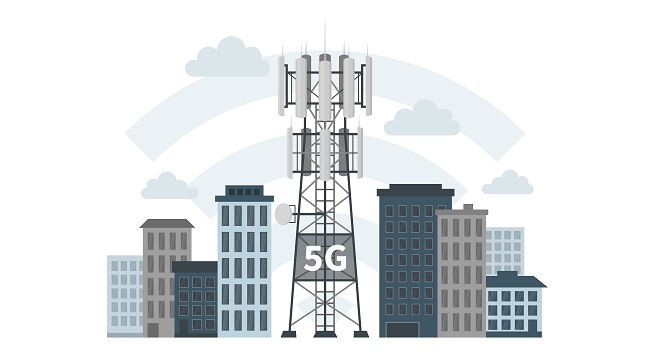What does '5G' mean?
5G refers to the fifth generation of mobile communications and is thus the direct successor to 4G. For consumers, the technology means a significantly faster mobile network and a growing number of connected devices in everyday life.
Are you interested in learning more about 5G topics at BSI?
What are the key benefits of 5G?
The advantages of 5G technology over its predecessors enable new applications. For example, television broadcasts could be transmitted over the internet from multiple perspectives without delay. Smart cars will be able to share their telemetry data with each other to prevent accidents. And in gaming, virtual realities can be experienced simultaneously, regardless of location.
5G is superior to 4G in many ways. For example, speeds will increase while latency will decrease.
The higher transmission speeds improve efficiency. In addition, the low latency enables real-time communication between end devices, opening up new possibilities: experts can support medical interventions by transmitting camera images in real time, sophisticated simulations can be easily brought to the customer, and entire cities can become smart cities.


Is the 5G network secure?
The deployment of a 5G (standalone) mobile network will fundamentally improve several aspects of security. There is an opportunity to build a much more reliable, resilient and secure network. The individual security mechanisms are listed below:
- 5G components are secured separately with new cryptographic solutions. This ensures that if one component is compromised, the protection of the others will continue.
- When roaming on a foreign network, the dialled terminal sends an indication of the mobile operator's identity back to the home mobile operator. This mechanism ensures that the device has dialled into a recognised network and that the exchange of information remains protected. This mechanism has been introduced in 5G.
- A subscriber's International Mobile Subscriber Identity (IMSI) will be encrypted in 5G. This no longer open transmission offers increased data protection, as cyber criminals will no longer be able to eavesdrop using a traditional IMSI catcher.
The speed at which individual operators migrate their networks will also depend on how many new 5G applications emerge and are adopted over the next few years. Some of the benefits of 5G, such as faster data rates, can be realised in combination with existing 4G infrastructure (non-standalone). In this case, however, the new security mechanisms will not come into play.
What makes 5G different from previous technologies?
These improvements are made possible by changes to the standard in the core of the 5G network, a new type of air-interface transmission technology and significantly increased radio frequency ranges (3.4 - 3.8 GHz). The higher frequencies offer the advantage of being able to transmit more information in less time, but at the cost of greater range. As a result, a large-scale 5G network will require many more cell towers than today.
In addition, the network of the future will be much more variable than a 4G network. This means that network management tools will be able to detect whether there are a few devices consuming a lot of data or many devices with comparatively low demand in one place. Algorithms will be able to adjust and precisely distribute the network's performance parameters according to the requirements identified.
What should users be aware of in the future?
Consumers' ability to influence security features is likely to be limited to the settings provided by the mobile operating system on the device. For example, it is not yet clear whether the user will be able to configure a device to be active only on the 5G network.
In any case, the choice of network operator is only one piece of the puzzle. The most secure operator is of little use if apps or other 5G services, such as connected driving, virtual reality or smart homes, do not adequately protect critical data. Consumers will need to be at least as careful in choosing apps and service providers in 5G as they are today.
- Short URL:
- https://www.bsi.bund.de/dok/12160894




